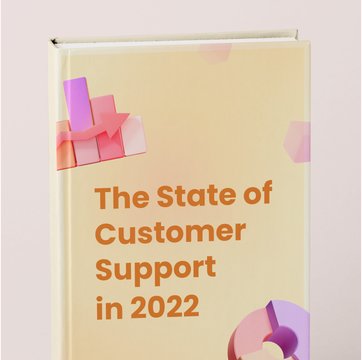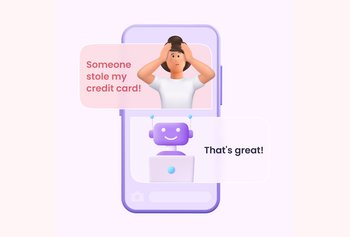Exclusive Research 2025 – 72% of Customers Switch Brands after a Negative Experience

Table of contents
Great customer support is the cornerstone of any successful business today.
Many companies have realized this and are investing heavily in people, processes and technology – to provide memorable support experiences.
But what is the ground reality? What do customers think about the support they receive?
To get to the bottom of this, we conducted a customer satisfaction survey of 1200+ consumers in the US.
The result? Hiver’s ‘The State of Customer Support’ report – a comprehensive research on customer service quality and how consumers’ expectations are changing.
This customer service benchmark report is beneficial for companies of all sizes. It helps you understand modern-day customers better, create more efficient support processes, and build customer loyalty.
Table of Contents
- 7 Key Insights from Hiver’s Customer Service Research Report
- 1. 77% of customers use email, while 63% prefer Live Chat*
- 2. 39% of customers hate long waiting times
- 3. 38% of customers feel chatbots cannot relate to their problems
- 4. 51% of customers say getting support via email is time-consuming
- 5. 52% of customers want their queries to be resolved within a day
- 6. 72% of customers switch companies after a negative experience
- 7. 52% of customers want fast, personalized, and interactive support
- The Cost of Bad Customer Service
- 9 Quick Tips to Improve Customer Service
- What does it truly take to deliver really good customer support?
7 Key Insights from Hiver’s Customer Service Research Report
In our analysis of some crucial customer service benchmarks, we arrived at some interesting insights that businesses must take note of.
1. 77% of customers use email, while 63% prefer Live Chat*
Different customers interact with companies through different means. But what are the most popular channels in a customer journey?
Turns out, email takes pole position. 77% of customers prefer contacting brands via email. It’s easy to use, accessible, and asynchronous in nature – all of which make it an extremely popular communication channel.
Next in line is live chat – which got 63% of the votes. Today, customers want answers to their questions in real time. And live chat makes this possible.
Other channels customers use are social media (28%) and communities and forums (10%). All of this shows that prioritizing customer service requests across multiple channels is crucial for businesses.
*Multiple choice question
2. 39% of customers hate long waiting times
Having to wait on calls is one of the most frustrating things. What’s even more irritating is an agent transferring your call to another agent.
Our feedback survey showed us that 3 out of 4 customers get frustrated by long waiting times on call and having to repeat queries multiple times.
Businesses must take steps to minimize this, or else they face the risk of losing loyal customers. Monitor your wait times, and constantly look for ways to reduce them.
Here are some tips to reduce your customer wait times and reduce churn.
- Be transparent and let your customers know how long it will take to resolve a query.
- If you think the resolution is going to take time, follow up and inform the customer that you’d call back.
- Offer effective training to your support agents so that they’re up to speed on your products and services.
3. 38% of customers feel chatbots cannot relate to their problems
How do you feel about interacting with a chatbot? Do you get answers as expected?
Our customer service survey noted that about 40% of consumers are frustrated with chatbots, as they aren’t able to relate to their issues. About 35% state that they want to interact with an actual human.
How do you fix this? How to analyze customer sentiment? Here’s a detailed guide to help stop chatbots from upsetting your target audience.
4. 51% of customers say getting support via email is time-consuming
Faster response times can directly impact customer satisfaction and even give you an edge over your competitors.
Yet, 51% of customers say that it takes too long to get a response from support agents via email, while 20% of the answers offered are unclear.
Here are some quick tips to improve your email response time.
- Use canned responses with email templates.
- Set clearly defined SLAs so that everyone in your team is aware of the service standard that needs to be met.
- Use a robust customer service platform to improve the quality of email support.
Vacasa, a travel company, handles support emails 80% faster with Hiver. I can see how the workload is distributed within my team. My team is more organized than ever.” – Sonia Cruz, Owner Care Manager for South America, Vacasa
5. 52% of customers want their queries to be resolved within a day
It comes as no surprise that every 3 out of 4 customers want their queries resolved within a day.
Today, speed of service matters as much as the quality of service. At the same time, not all queries can be resolved in a matter of minutes.
In cases where your team needs more time, communication is key. A response such as, “We understand your problem and are doing our best to fix it. We shall get back to you in 48 hours.” would help set expectations and not keep the customer in the dark.
In some scenarios, it’s best if the customer looks for the answers themselves. You can enable self-service by creating a comprehensive knowledge base. Build a repository of commonly asked questions and valuable information that customers can refer to anytime. This also reduces the workload of your support team.
6. 72% of customers switch companies after a negative experience
Customers today are highly vocal and spoilt for choice. 3 out of 4 customers will plan to switch brands after a negative support experience.
What do customers do after a negative support experience?
It’s also alarming that 52% of them will inform their friends and family not to purchase from the brand they’ve had a bad experience with.
So, how can you prevent negative support experiences?
- Collect regular customer feedback. This will give you a clear idea of how people perceive your brand.
- Particularly focus on negative feedback and work on it. Similar to how Domino’s refreshed their pizza recipe.
- Be honest and transparent with what you can offer customers. Don’t overpromise and underdeliver.
7. 52% of customers want fast, personalized, and interactive support
Great customer service doesn’t happen overnight. It takes careful planning and constant improvement to get there.
How do customers perceive a great support experience?
Our report reveals that 52% of consumers consider a great customer experience as one that is quick, personalized, and involves interacting with a highly knowledgeable service team.
Constantly delight your customers by following these best practices:
- Anticipate your customer needs.
- As much as possible, get human reps (and not bots) to man your support channels. This helps personalize interactions.
- Invest in frequent training for your support staff.
- Measure customer satisfaction levels through metrics such as CSAT score and Customer Effort Score (CES).
The Cost of Bad Customer Service
Bad customer service can have a long-lasting impact on a business – and not in a good way.
- Customer dissatisfaction: Bad customer service can lead to dissatisfied customers who may choose to switch to competitors or stop using your products/services altogether.
- Negative word-of-mouth: Unsatisfied customers are more likely to share their negative experiences with friends, family, and online communities. Word-of-mouth can spread through social media and review platforms, negatively impacting the company’s reputation.
- Reduced customer lifetime value: When customers have a negative experience, they are less likely to make repeat purchases and become long-term, loyal customers. This reduces the lifetime value of such customers.
- Increased customer service costs: Poor customer service often leads to an increase in customer complaints and support requests. Handling these issues can be time-consuming and costly, especially if it requires escalations or refunds.
- Decline in employee morale: Frontline employees dealing with frustrated customers may experience increased stress and burnout, leading to a decrease in their morale and productivity.
- Legal and regulatory consequences: In some cases, bad customer service can result in legal challenges or regulatory actions, especially if it involves deceptive practices or violates consumer protection laws. If a number of customers face the same problem without a resolution, they may file a class action lawsuit to seek compensation for their troubles. In some cases, plaintiffs in a class action lawsuit might not need to provide detailed proof of individual damages to receive compensation, as certain no proof class action lawsuits adhere to widespread issues where proving individual harm is less critical.
9 Quick Tips to Improve Customer Service
Remember, satisfied customers are more likely to become brand advocates and help your business grow through positive word-of-mouth. Here are some tips to improve customer service:
- Training and Empowerment: Invest in comprehensive training for your customer service representatives to enhance their communication skills, problem-solving abilities, and product knowledge. Empower them to make decisions and resolve issues without unnecessary escalations.
- Active Listening: Teach your staff the importance of active listening to understand customer concerns fully. Demonstrate empathy and ensure customers feel heard and valued.
- Speed and Efficiency: Aim to resolve customer inquiries and issues promptly. A quick response time can alleviate frustration and leave a positive impression.
- Customer Feedback: Encourage customers to provide feedback on their experiences. Use this feedback to identify areas for improvement and address common pain points.
- Personalization: Tailor interactions according to the customer whenever possible. Personalized service can make customers feel special.
- Employee Recognition and Incentives: Recognize and reward support staff who go the extra mile.
- Continuous Improvement: Regularly review and analyze customer service metrics and customer feedback to identify trends and opportunities for improvement.
- Proactive Communication: Reach out to customers proactively, such as sending updates on their orders or providing relevant information to prevent potential issues.
- Learn from Mistakes: When mistakes happen, acknowledge them, apologize, and take corrective action. Customers appreciate honesty and efforts to rectify problems.
What does it truly take to deliver really good customer support?
All these insights from our customer service survey lead to one simple conclusion: the need for companies to deliver better, faster, and more ‘human’ customer support for a positive experience.
Something that can help with this is Hiver – a customer service platform built within Gmail.
The biggest advantage of Hiver is that it humanizes customer service. It’s also extremely easy to learn and use for your teams. You can try it for free for 7 days.

































